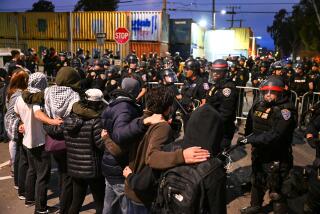Berkeley-Trained Group Plays Key Role
JAKARTA — After winning its war of liberation against Dutch colonizers in 1949, the old East Indies became a modern nation called Indonesia, one of the most populous and poorest in the world--twice as poor as India.
Years of exploitation by Holland left the country nearly devoid of infrastructure, not just in roads and rails, but more importantly, in human terms. The people were largely illiterate. Public schools didn’t exist; the university in the capital was for Dutch students.
The newly independent republic had only one native economist.
Today, Indonesia is a success story in Third World development, having triumphed over a stagnant, Soviet-style command economy. The country might offer clues on reform to the former Soviet republics.
How it got on track to capitalism is a little-known Cold War tale, one in which the “Berkeley Mafia” played an inestimable role.
Forty years ago, Indonesia’s lone economist, Dutch-trained Prof. Sumitro Djojohadikusumo, prevailed over adversity to transmit the dismal science to a handful of bright young men at the University of Indonesia.
At the time, capitalism was denounced as a social evil by President Sukarno, a wiley strongman who was juggling the political forces of a gathering communist movement against his powerful military.
A half dozen of Sumitro’s pupils were spirited abroad in the late 1950s for advanced studies in classic economics--initially, as chance would have it, at UC Berkeley.
Funded by the Ford Foundation, the Berkeley graduate students were trained to be professors, but they returned home destined to guide their country down a precipitous path toward market-driven economics. With their mentor Sumitro in political exile after being ejected from Sukarno’s cabinet, they took refuge in academia.
But by teaching part-time at the Army Staff College, they reshaped the thinking of a rigid military, inculcated with the tenants of socialism and anti-imperialism during the struggle for independence. After a chaotic period in the mid-1960s--a communist insurrection that triggered a coup and counter-coup--the Berkeley scholars came into their own as advisers to the “new order” regime of the new president, Gen. Suharto.
“We were overwhelmed by crisis,” recalled one of the Berkeley-trained advisers, Emil Salim, now the environment minister. “We’ve been criticized for not paying enough attention to social equity, but the problems were so big, you had to hit with a knife, not carve with a scalpel.”
Using tight monetary policy, they beat down triple-digit inflation, which Sukarno’s economic team had attempted to curtail by snipping paper currency in half. They stabilized the rupiah by making it convertible, and reopened the door to foreign investment, giving back assets that had been seized and nationalized. Petroleum companies came in, and the oil flowed.
The achievements of the Berkeley Mafia and their continuing influence today speak of an uncanny ability to survive--and also a knack for knowing just how far to push. The technocrats have avoided open confrontation over increasingly blatant nepotism and cronyism allowed by President Suharto. And they have picked their battles in structural reform of the economy, focusing mainly on macroeconomic policies.
“We still have a planned economy,” said Mohammad Sadli, a former oil minister and the first Indonesian economist to study at Berkeley. “But this is rather mild compared to the old days, when we had Soviet-style price controls.”
Suharto owes much of his credibility to smart moves by the Berkeley technocrats--Salim; Sadli; Widjojo Nitisastro, a reclusive and powerful former economic coordinating minister who still guides policy; and others like Finance Minister J. B. Sumarlin and retired finance minister Ali Wardhana.
Suharto was one of Sadli’s students at the Army Staff College in the late 1950s, beginning a tenuous “alliance” between the powerful military and the Berkeley economists that continues.
“We were never sure whether this alliance with the military and Suharto would last long,” recalled Sadli. “But after 25 years, the group still hasn’t been thrown out. We didn’t foresee that.”
Aspersions were cast on the Berkeley Mafia--and on the Ford Foundation and the UC administration for creating them--in a 1970 article in “Ramparts,” the now-defunct iconoclastic magazine. Writer David Ransom alleged that the scheme to train an economics faculty for the University of Indonesia was part of a Central Intelligence Agency plot to groom sleeper agents who would eventually promote pro-American, anti-communist Cold War interests.
“I don’t buy this conspiracy theory--we weren’t that naive to be used,” said Salim, the environment minister. “And if it were true, I wouldn’t criticize the United States the way I do today.”
More to Read
Sign up for Essential California
The most important California stories and recommendations in your inbox every morning.
You may occasionally receive promotional content from the Los Angeles Times.










